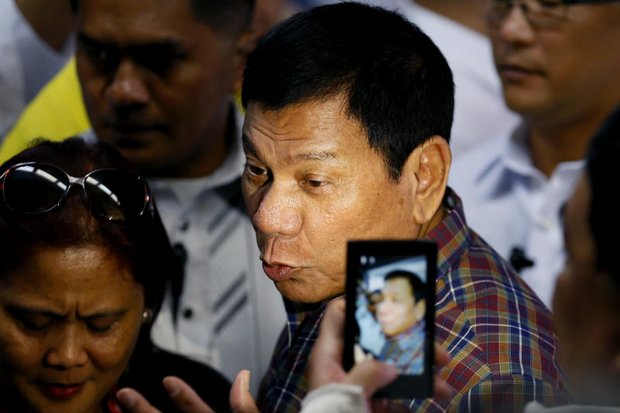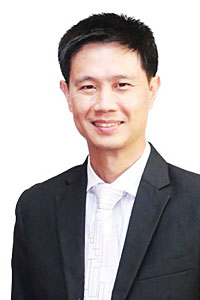
At the invitation of Japan's Dokkyo University, I was in Manila earlier this week to attend a media forum where I rubbed shoulders with journalists from Southeast Asia and Japan.
Topics at the forum, funded by the Japan Foundation, varied, ranging from maritime security and the South China Sea dispute to the boom in infrastructure projects in Asia amid a race between China and Japan to fund those projects.
But the hottest topic, which was not listed on the agenda, was Philippine President Rodrigo Duterte's deadly war on drugs -- a campaign policy that landed him a landslide presidential election victory in May.
The death toll of drug-related killings in the Philippines has surpassed 2,000, just two months after Mr Duterte was sworn in as the Philippines' 16th president on June 30.

Nopporn Wong-Anan is deputy editor, Bangkok Post.
Newspapers run daily stories of suspected drug pushers being killed on the streets as television news and political talk shows endlessly run reports and debates over this controversial practice, which won't end anytime soon.
A former Davao mayor in the highly urbanised city on Mindanao island for seven terms, the 71-year-old lawyer is nicknamed the "Punisher" and "Duterte Harry" for his brash demeanour, tough talk and shoot-to-kill crime crackdowns.
Not afraid to offend, Mr Duterte's remarks have upset the United Nations and the United States.
He called Philip Goldberg, US Ambassador to the Philippines, gay in derogatory terms, after Mr Goldberg criticised Mr Duterte's rape comments during the presidential campaign. Threatening to pull the Philippines out of the United Nations because of condemnation of extra-judicial killings, "Rody" said he did not "give a sh*t" about the consequences.
That reminds me of our fugitive former prime minister Thaksin Shinawatra, who said in March 2003, "The UN is not my father," when he was asked by a reporter about reports that the UN might send a team to Thailand to probe the extra-judicial killings of the drug war.
In February 2003, Thaksin launched a "war on drugs" to suppress drug trafficking and prevent drug use, but the main outcome of this policy was arbitrary killings. The first three months of the campaign saw some 2,800 extra-judicial killings.
"We have to be as ruthless with drug dealers as they are to our children," Thaksin said in a speech in Bangkok in January 2003, a few days before his proposed war on drugs began. Thaksin went on to say drug dealers "deserved" to be shot dead and have their assets seized.
HIV prevention and treatment efforts were also seriously compromised with fear of arrest and mistreatment driving people who injected drugs away from essential harm-reduction services, according to the US-based Human Rights Watch.
After a local and international outcry, Thaksin ended the war on drugs and declared it a success.
After the 2006 coup that ousted Thaksin, an official investigation took place in 2007 and found that more than half of those killed had no connections to drugs.
In early 2008, then prime minister Samak Sundaravej, dubbed a Thaksin proxy, vowed to wage another anti-drug war "rigorously", but the National Human Rights Commission cautioned the government.
Citing investigations of complaints by the families of victims, then human rights commissioner Vasant Panich told me that many of the people killed in the three-month war on drugs were victims of envious neighbours or had existing feuds with police officers, instead of it being strict enforcement of the rule of law.
The agency found many of the dead involved in 70 complaints filed by their families were on government lists of suspected dealers because of disputes with police or were singled out by neighbours suspicious of their wealth.
There had been no arrests of people who used automatic weapons to eliminate suspected drug dealers, Mr Vasant said, hinting at accusations by human rights groups that many of the dead were victims of extra-judicial killings by police.
Despite a decades-long campaign, narcotic drugs use shows no signs of abating in Thailand.
Justice Minister Paiboon Koomchaya said last month Thailand is on the wrong track in its efforts to address drug problems and it is time to treat drug abuse as a health issue rather than a crime.
Speaking at the "Thailand's Drug Policy Revisited" forum held by the Thailand Institute of Justice, Gen Paiboon said the high number of drug offenders and widespread drug abuse in communities show drug policy is failing.
"It has been wrong all these years. If not, why do 70% of drug offenders remain in prison? Why does the problem persist despite thousands of deaths? And why do people still complain about drugs in their community? They're telling us there's something wrong," Gen Paiboon said.
He said on Monday the Justice Ministry will seek the use of Section 44 under the interim charter to remove methamphetamine, or ya ba, from the dangerous narcotics list.
He said once Section 44 is invoked by the prime minister to remove methamphetamine from the dangerous drugs list, health authorities can begin to use it for medical treatment.
As Mr Duterte embarks on state visits to Southeast Asian neighbours, junta leader Prime Minister Prayut Chan-o-cha may want to offer his counterpart some advice on efforts to fight the drug menace when the populist politician visits Bangkok.
